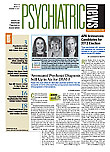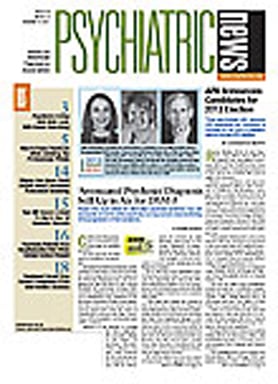Early age of first antipsychotic treatment, recent hospitalization, and a history of substance abuse are among the most prominent risk factors for hospitalization among patients with schizophrenia, according to an analysis of data from the Clinical Antipsychotic Trials of Intervention Effectiveness (CATIE).
The prospective analysis of data on 1,460 CATIE participants followed from the time they began a randomized trial of medication to first schizophrenia-related hospital admission revealed a risk profile for hospitalization that clinicians will readily recognize in their most severely ill patients. The analysis appears in the October Psychiatric Services.
Increased risk of hospital admission was associated with early age (defined as 17 or younger) of first antipsychotic treatment, psychiatric hospitalization in the past year, having had DSM-IV alcohol or drug use disorders in the past five years, presence of tardive dyskinesia, a high score on the positive symptoms subscale of the Positive and Negative Syndrome Scale, and low social functioning.
"Clinicians continually grapple with decisions regarding what level of care their patients require," lead author Mark Olfson, M.D., told Psychiatric News. "Patients at high risk for hospital admission may need a somewhat higher level of monitoring and support than other patients. The risk profile we found will strike many clinicians as all too familiar. Nevertheless, I think it is helpful to know that prospective evaluations confirm these risk factors. These findings will hopefully help to focus clinical attention on high-risk patients."
Olfson is a professor of clinical psychiatry at Columbia University Medical Center.
Data for the analysis were drawn from the first phase of the National Institute of Mental Health's CATIE study in which adults who were between the ages of 18 and 65 and met DSM-IV criteria for schizophrenia were randomly assigned as outpatients to receive olanzapine, perphenazine, quetiapine, risperidone, or ziprasidone under double-blind conditions. The frequency of first-observed inpatient admissions for exacerbations of schizophrenia per 10,000 follow-up days on initially randomized antipsychotic medication was determined overall and stratified by baseline patient characteristics.
During the first phase of the study, 203 of the 1,460 patients (14 percent) were admitted as inpatients on one or more occasions. The overall frequency of first hospital admission was 6.4 per 10,000 days of follow-up of subjects in the study.
Psychiatric hospital admission in the prior year emerged as the most powerful predictor of hospital admission; first antipsychotic treatment at age 17 or younger was also strongly and independently related to risk of hospital admission. Major depressive disorder and anxiety disorders occurring during the previous five years were not significantly related to hospital admission, but occurrence of alcohol and drug use disorders during this period significantly predicted risk of hospitalization in unadjusted and adjusted models.
Risk of hospitalization also differed according to initial antipsychotic medication assignment in the trial. Quetiapine was associated with the highest risk, with 18 percent of patients initially assigned to the medication being hospitalized. That was followed by ziprasidone with 17 percent of patients being hospitalized, and perphenazine with 14 percent; olanzapine had the lowest rate (10 percent), with risperidone at 13 percent.
Olfson cautioned, however, that the risk profile for antipsychotics revealed in the analysis needs to be weighed against other patient characteristics in the choice of an appropriate medication for patients.
"Many factors determine an individual patient's risk of hospital admission," he said. "Consistent with earlier analyses, we found that antipsychotic medications differ in the protection they afford to hospital admission. In practice, selecting the most appropriate antipsychotic medication for an individual patient should balance the pattern of our findings with other important considerations such as past response to the specific antipsychotic medication, patient preferences, and the side-effect profile."

